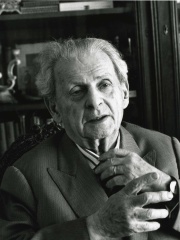

The Most Famous
Philosophers from Lithuania
This page contains a list of the greatest Lithuanians Philosophers. The pantheon dataset contains 1,267 Philosophers, 2 of which were born in Lithuania. This makes Lithuania the birth place of the 52nd most number of Philosophers behind Armenia and Cyprus.
Top 2 Philosophers
The following people are considered by Pantheon to be the most legendary Lithuanians Philosophers of all time. This list of famous Lithuanians Philosophers is sorted by HPI (Historical Popularity Index), a metric that aggregates information on a biography's online popularity.
- #1

Emmanuel Levinas
1906 - 1995
HPI 77.3850 langsEmmanuel Levinas is a philosopher who is most famous for his work on ethics and the other.

